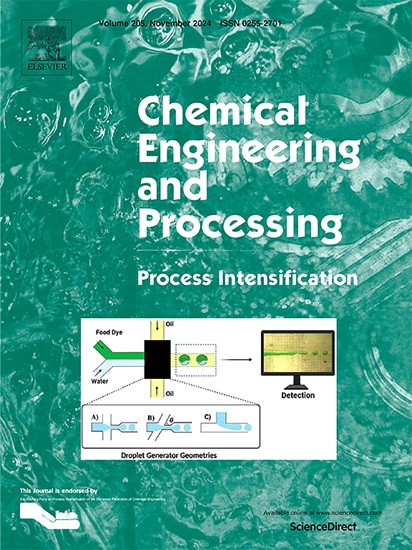A meta-heuristic approach for heat-integrated distillation sequence synthesis with nonsharp splits and thermal coupling
IF 3.8
3区 工程技术
Q3 ENERGY & FUELS
Chemical Engineering and Processing - Process Intensification
Pub Date : 2025-06-25
DOI:10.1016/j.cep.2025.110411
引用次数: 0
Abstract
The synthesis of multicomponent separation systems is an important field in process engineering. Separation systems such as distillation trains have high energy demands. Hence, strategies for mitigating energy requirements in these processes are fundamental. Therefore, methods that can yield heat-integrated distillation sequences (HIDiS) are useful for reducing energy-related expenses in an industrial plant. This work presents an improved meta-heuristics-based framework for the synthesis of HIDiS encompassing nonsharp splits and intensification strategies such as thermal coupling and nonsharp distillation columns with side streams. The method is based on a sequence of two bi-level optimization strategies: one for the distillation sequence with simultaneous implicit heat integration (via multi-utility Pinch Analysis based approach) and one for the explicit heat exchanger network synthesis. Results show that considering the aforementioned options in HIDiS synthesis leads to more economically efficient configurations than in simpler heat-integrated configurations (e.g., sharp splits, no column stacking). Solutions achieved in literature case studies outperformed previous works by 8.3 % and 5.2 %.

具有非尖锐分裂和热耦合的热集成蒸馏序列合成的元启发式方法
多组分分离系统的合成是过程工程中的一个重要领域。蒸馏系统等分离系统对能量的需求很高。因此,在这些过程中减少能源需求的策略是基本的。因此,能够产生热集成蒸馏序列(HIDiS)的方法对于降低工业装置中的能源相关费用非常有用。这项工作提出了一个改进的基于元启发式的框架,用于综合hidi,包括非尖锐分裂和强化策略,如热耦合和带有侧流的非尖锐精馏塔。该方法基于两个双层优化策略的序列:一个用于同时隐含热集成的蒸馏序列(通过基于多实用夹点分析的方法),另一个用于显式换热器网络综合。结果表明,在hidi合成中考虑上述选项比简单的热集成配置(例如,尖锐分裂,无柱堆积)更经济有效。在文献案例研究中获得的解决方案比以前的工作高出8.3%和5.2%。
本文章由计算机程序翻译,如有差异,请以英文原文为准。
求助全文
约1分钟内获得全文
求助全文
来源期刊
CiteScore
7.80
自引率
9.30%
发文量
408
审稿时长
49 days
期刊介绍:
Chemical Engineering and Processing: Process Intensification is intended for practicing researchers in industry and academia, working in the field of Process Engineering and related to the subject of Process Intensification.Articles published in the Journal demonstrate how novel discoveries, developments and theories in the field of Process Engineering and in particular Process Intensification may be used for analysis and design of innovative equipment and processing methods with substantially improved sustainability, efficiency and environmental performance.

 求助内容:
求助内容: 应助结果提醒方式:
应助结果提醒方式:


